#the intellectual;julian
Note
so who would still like me even if I was a worm
@astremourante | the list is long but let me readapt to gib it to Jules specif--
---
Julian likes books. Julian likes cartoons, nothing to be ashamed about. Julian likes warm drinks, cosy pullovers and shoes that make them look like they belong into a fancy library.
Which they most likely spend a lot of time in.
Knowing this, painting a picture of Julian becomes relatively easy.
Mellow. Bookworm. Maybe secretly a smartass or most likely simply someone who enjoys tranquillity and staying in.
Correct... ish.
Because Julian also really, really likes Selene. And Selene is very rarely anything of the above. Even when they do somehow end up dragging her along somewhere, she takes up space in a way entirely different to the way he slips into it.
He keeps to himself, is polite, greets in nods and pleasant smiles. And Selene? Well, Selene seems capable of blending in in whatever scenario they stumble into. Except that she glows so brightly and is thrumming with so much ferocious life at all times that Jules completely forgets what the hell he was even getting up to.
They grasp at the thoughts before they vanish entirely, hoping it goes unnoticed how one minute eye contact can tip them slightly off his axis, but even with the initial purpose tightly grasped in his hands, Julian is still... aware of Selene.
Like a star knowing just exactly where the moon glows. Closer to Earth. Closer to being alive.
So, it's no surprise to see them lift his head immediately at the sound of her voice. He trails a sentence with his finger for a moment, finds the end of it, rests their finger on the page and looks up at Selene.
And if he looks like he's looking at stained glass, well...
"I- excuse me?" rapid blinking, bemused smile tilting along with his head as he rights it and waits, as though there was anything to add to a question that proves perfectly sufficient in its demand on its own.
Julian clears his throat, acts pensive, forefinger curled in a hook over their lips, small hum.
"I don't see why not. Maybe I'll become a worm too, then it certainly wouldn't even be up for debate," a sheepish shrug, glistening eyes, stealing the light of her glow to reflect it back at her, softened, softened into honesty.
"I don't think anything could make me not like you, Selene."
#astremourante#the intellectual;julian#to be tagged;amelia & julian#i love throwing in 'Selene' in soft moments to make it Sting real nice#so i kinda went with Amelia just asking not 'who' but 'would you' IF THAT'S OKAY???? JUST to make it work like this I'M SOrrY#tumblr accidentally double sent it so if you'd like me to take this elsewhere i can rewrite it >:3#;answered
8 notes
·
View notes
Text
Ignore all logistical considerations of "would they ever meet each other under these circumstances". If you don't think Jules Bashir would have chosen to join Starfleet, imagine he is on the station for some other reason, or they meet in some other location.
I wanted to make this poll because I've seen various fics where Garak reassures Julian that far from being upset over him being augmented, Garak is grateful for it, either explicitly because (he thinks) they wouldn't be able to have their usual conversations if it weren't for the augmentations, or simply because he likes Julian "just the way he is" and wouldn't want him to be "different". I disagree that Garak would think like this (or at the very least, I think Julian would react negatively if he did, rather than be reassured), so I wanted to hear everyone else's thoughts.
#garashir#Star Trek: Deep Space 9#this is not just a shipping question btw so please answer whether you view them platonically/romantically/whatever!#Julian Bashir#polls#Starky's original posts#I'll admit. to me there is a very clear right and wrong answer here.#again not in terms of Garak's characterization so much as in terms of JULIAN'S.#I would be fine if Garak said this and Julian felt at least somewhat conflicted about it but I've never seen even that........#I've wanted to make this post for SO LONG but it's a very common thing in a lot of fics that I otherwise REALLY LIKE#from authors that I REALLY LOVE AND ADMIRE#and I have no idea if I'm just being completely insane and oversensitive OTL#but I just read yet another fic where Garak was like ''I have no choice but to be grateful you were genetically enhanced#because Jules would never have joined Starfleet so we never would have met.''#and I just want to yell WHY DO YOU ALL ASSUME THAT#like not even getting into assuming that Jules would be permanently significantly intellectually disabled#based on limited information about his early childhood developmental delays#but more importantly assuming he wouldn't (read: couldn't. because I KNOW that's what you mean.) end up on the station#You! Star Trek fan! Do you think people with intellectual or learning disabilities are allowed in Starfleet? Answer quickly! :)#sorry I told you I've held onto this for too long. and now I'm a deranged bitch about it :|
42 notes
·
View notes
Text
I love the episode where Bashir has lunch with O’Brien instead cuz Garak is away and he’s like what do you mean normal people don’t have deep philosophical conversations over lunch why are you so boring Miles?!
#garak is the only one who matches his intellectual lunch conversations energy <3#garashir#deep space nine#ds9#Julian Bashir#garak#Star Trek
307 notes
·
View notes
Text
When Dr. Julian Devorak used science to figure out that The Tower is actually a loop, I was ready to propose right then and there.
#shitpost#Dr. Julian Devorak is very intellectual I love him dearly#julian the arcana#the arcana julian#julian devorak
45 notes
·
View notes
Text
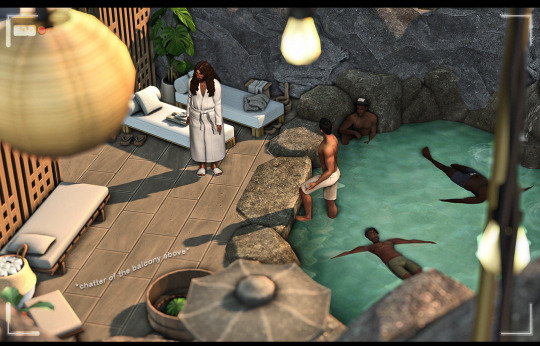
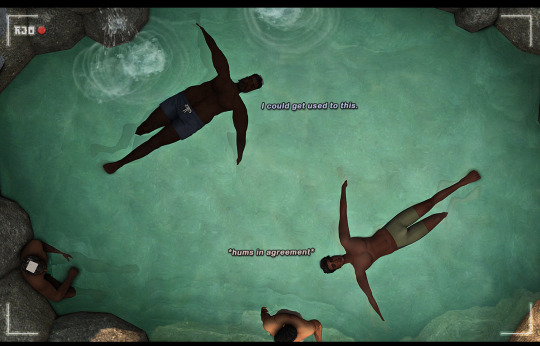
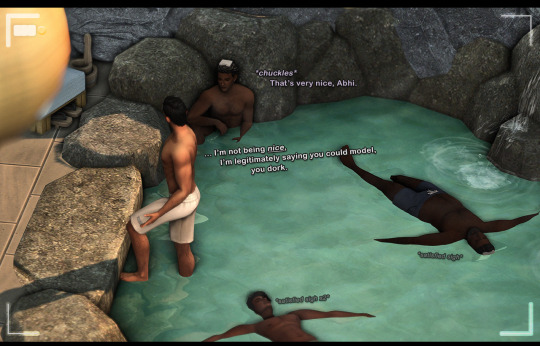
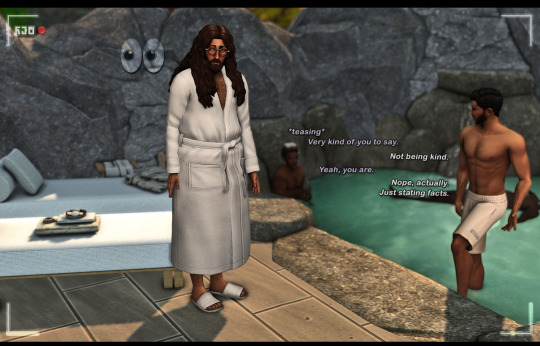

Kiss Me in Komorebi+ 🌸
[Ep. 16] The Beach Episode Spa Arc
[ Part 6 of 15 ] 🌹
@julietisufferingwiththeuser @hallasimss @anarchosimdicalist @mattodore @morrigan-sims @gothoffspring
#hmm... what does ivor hear??#ts4#ts4 gameplay#ts4 screenshots#ts4 challenge#ts4 bachelor challenge#;kmik#ivor korrapati by anarchosimdicalist#suraj kennedy by gothoffspring#francis paul by julietisufferingwiththeuser#abhilash raavi by hallasimss#darol bennet by lre333#julian vance by mattodore#julien west by morrigan-sims#||#suraj's bulge owning this whole fcking post nbd#not francis teasing poor abhi omg (i caught him complimenting francis' appearance dfkjgh)#darol and suraj are lil intellectual buddies man they love discussing gardening and debating the wellness skill and logic puzzle moves bwuh#also AHEM have we noticed two sims are missing from this post because ivor didn't COUGH HACK
53 notes
·
View notes
Text
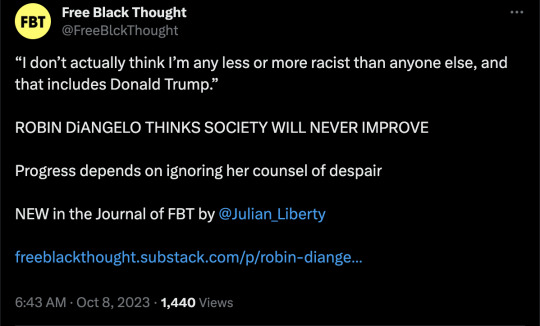
By: Julian Adorney
Published: Oct 8, 2023
ROBIN DiANGELO THINKS SOCIETY WILL NEVER IMPROVE
Progress depends on ignoring her counsel of despair
Robin DiAngelo is one of the most influential people in American culture. Her term “white fragility” made the shortlist as an Oxford Word of the Year in 2017, and that was before she really blew up. Her mega-bestseller White Fragility (2018) has reached millions of readers. Her speaking fees run tens of thousands of dollars per hour, and she's given keynotes and trainings at countless universities and corporations.
With all her influence, it’s worth asking: should we be taking advice from her on how to reduce racism? I think the answer is no. For one thing, in spite of the fact that Social Justice Fundamentalists crow about how DiAngelo is the author that you need to read or listen to if you want to do your part to fight racism, DiAngelo herself doesn’t seem to think that racism can be beaten. If she doesn’t believe in the efficacy of her own work, why should we?
DiAngelo doesn’t think much of the idea that individual people can become less racist. In White Fragility, she says that “racism is unavoidable and … it is impossible to completely escape having developed problematic and racial assumptions and attitudes.” Speaking of herself (DiAngelo is white), she says that “I also understand that there is no way for me to avoid enacting problematic (racial) patterns.” For DiAngelo, no matter how much work you do, you're always going to be a racist.
Indeed, DiAngelo reserves some of her harshest criticism for people who think they have actually worked on their racism. In a telling passage, DiAngelo talks about “white people who think they are not racist, or are less racist, or are in the ‘choir’ or already ‘get it.’” Those people, she asserts, “cause the most daily damage to people of color.” That is: if you think that you're even a little bit “less racist,” then you’re in the group that (according to DiAngelo) does more daily damage to people of color than the established hate groups. For DiAngelo, you can of course increase your level of guilt and self-flagellation. But you’d better not think that makes you any less racist.
Of course, if people cannot change, then societies, which after all are made up of people, will also have a very hard time changing. And indeed DiAngelo argues that societal racial progress is often illusory. In Is Everyone Really Equal?, DiAngelo and co-author Özlem Sensoy endorse the idea of “new racism,” which they describe as “ways in which racism has adapted over time so that modern norms, policies, and practices result in similar racial outcomes as those in the past.” For DiAngelo, racist institutions such as Jim Crow didn’t really end; they just transformed. They may be less visible (they don’t “appear to be explicitly racist”) but they result in more or less the same outcomes. This is perhaps why DiAngelo describes “white supremacy” as “historical and continual” in White Fragility—that is, not something that we lived through, but something that we continue to live smack dab in the middle of.
Even when DiAngelo and Sensoy admit to some sort of racial progress (events like the election of President Obama are “significant and worthy of celebration”) they hasten to add that, “advances are also tenuous” and progress is liable to be rolled back. For DiAngelo, any positive change happens glacially; and even when it does happen, it’s generally a game of one step forward one step back. She and Sensoy stress that “systems of oppression are deeply rooted and not overcome with the simple passage of legislation.”
A great many Americans think that we’ve made strong racial progress as a society in the past 100 years. DiAngelo cautions against this kind of optimistic thinking. According to her and Sensoy, systems of oppression are “far less flexible than popular ideology would acknowledge.”
Why does DiAngelo think this way? In order to understand why her worldview leans so pessimistic, it’s necessary to understand her intellectual roots. Critical Theory (an umbrella term that includes Critical Race Theory, Critical Social Justice, etc.) is heavily influenced by the philosophy of postmodernism. In an article in Education Week praising Critical Race Theory, Stephen Sawchuk lays it out: “Critical race theory emerged out of postmodernist thought….” In a section of Is Everyone Really Equal? titled “A Brief Overview of Critical Theory,” DiAngelo and Sensoy note that two of Critical Theory's primary intellectual influences are Jacques Derrida and Michel Foucault. Derrida and Foucault are two of the standard bearers of postmodernism.
For the postmodernist philosopher, nothing ever changes. Postmodernists see the world in terms of social “discourses.” These discourses (for instance, the idea that men are more drawn to leadership positions than women, or the idea that it’s better to be wealthy than poor) have a profound influence on all of us. In Postmodernism: A Very Short Introduction, professor Christopher Butler describes this logic: for postmodernists, “our very identity, the notion we have of ourselves, is at issue when we are affected by discourses of power.” Most of us would admit that we are deeply influenced by our socialization, but postmodernists go much further. For postmodernists, we are our socialization, nothing more and nothing less. As Butler puts it, for postmodernist philosophers “the conflicting languages of power which circulate through and within individuals actually constitute the self.” Indeed, postmodernists don’t even speak of the “self”; they prefer the term “subject,” as in one who is “subject-ed” to the social discourses that they see and hear. For postmodernists, we actually don’t have any individual autonomy, or any real self, at all; we’re just the products of our socialization. Butler again: postmodernism endorses “a distinctive view of the nature of the self which was a challenge to the individualist rationalism, and the emphasis on personal autonomy, of most liberals.”
But if individual autonomy doesn’t exist, then of course personal development cannot either. If there is no self, then there can be no self-improvement. If we are all just subjects controlled by the forces of socialization, the “discourses,” around us, then how on earth could we possibly do anything on our own initiative to become less prejudiced?
This line of thought may be bleak, but it’s something that DiAngelo very deliberately leans into. Echoing postmodernists like Butler, she argues that the forces of socialization define us. “Our socialization is the foundation of our identity,” she and Sensoy claim. “The forces of socialization are powerful,” and “once the message of our superiority or inferiority is internalized, very little outside force is needed in order to ensure that we will play our social roles.” The “fundamental acceptance” of our role in society, shaped by the dominant discourses we see and hear, is “complete by an early age.”
Perhaps as a result of this, DiAngelo doesn’t think we have much in the way of free will. “The logic of individual autonomy that underlies liberal humanism (the idea that people are free to make independent rational decisions that determine their own fate),” according to her and Sensoy, “was viewed [by the founders of Critical Theory] as a mechanism for keeping the marginalized in their place by obscuring larger structural systems of inequality.” That is: we’re all defined by our socialization, and the idea that we can make any real progress for ourselves is just a myth that those in power use to keep oppressed groups down.
For DiAngelo, then, solving racism represents something of a chicken-and-egg problem. We’re defined by our socialization, so we cannot become less racist unless our socialization becomes less racist. But at the same time, our socialization is created and perpetuated by groups in power; so our socialization won’t change unless enough of us as individuals become less racist and then get into positions of power where we can change the discourse. Or as DiAngelo puts it herself in White Fragility, “Even if challenging all the racism and superiority we have internalized was quick and easy to do, our racism would be reinforced all over again just by virtue of living in the culture.” It’s the logic of a trap.
Indeed, DiAngelo herself has, in her own words, fallen victim to this trap. In a recent interview, she said that, “I don’t actually think I’m any less or more racist than anyone else, and that includes Donald Trump.” This is telling. DiAngelo has (presumably) been doing the work that she asks her readers to do, and for much, much longer. But after all of that, she’s still just as racist as the man who referred to Haiti and African nations as “sh*thole countries.” Her work has not made her any less racist; is it not fair to ask if it will fail us in the same way?
Thankfully, in the real world both individual and societal growth is possible. In the 1960s, the United States ended legal segregation; which, whatever DiAngelo and Sensoy seem to think, did represent a seismic shift in race relations and in equality under the law. On a more individual level, from 1958 to 2021, Gallup shows that support for interracial marriage increased from 4 percent to 94 percent of all Americans. That means a whole lot of people became a whole lot less racist. In the 1950s, white people tossed the n-word around like it was candy. Now, saying the n-word is a good way to get exiled from civil society.
Racism remains a problem, but looking to the DiAngelos of the world to help us cure it is like having strep throat and then going to a doctor who insists that strep throat cannot be cured or even treated. Not only is this vision fatalistic and unlikely to do much good, it’s also just plain wrong.
==
Why do people revere this racist lunatic?
#Julian Adorney#Robin DiAngelo#White Fragility#racism#postmodernism#postmodern religion#woke#wokeness#cult of woke#wokeism#wokeness as religion#intellectual fraud#religion is a mental illness
10 notes
·
View notes
Text
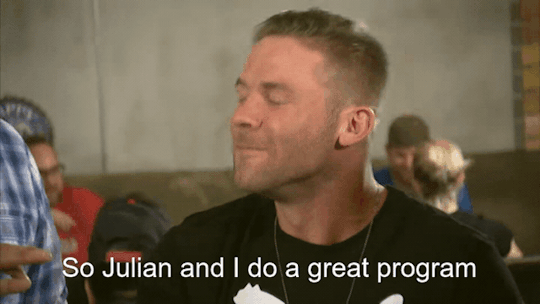
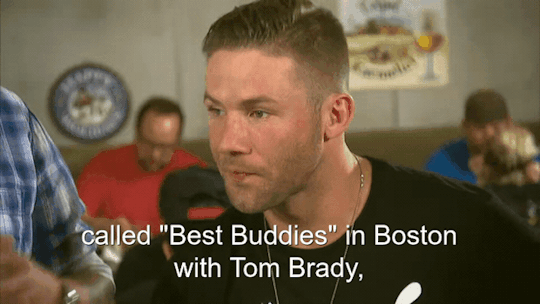
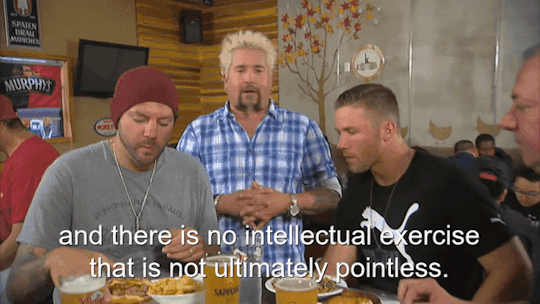
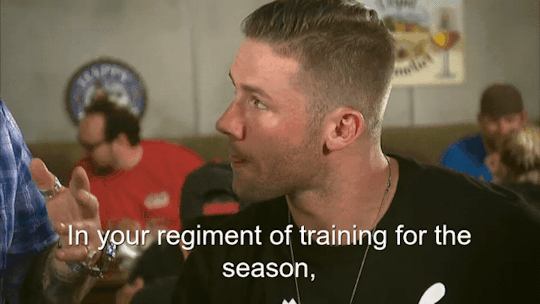
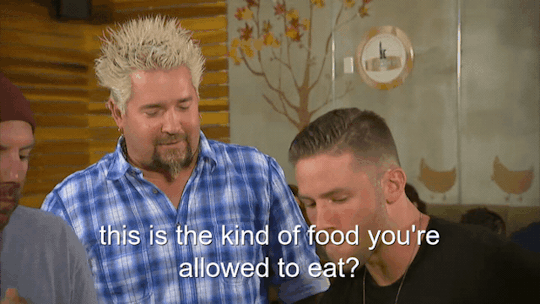
[So Julian and I do a great program called "Best Buddies" in Boston with Tom Brady, and there is no intellectual exercise that is not ultimately pointless. In your regiment of training for the season, this is the kind of food you're allowed to eat?]
#s22e10 indulgent dishes#guy fieri#guyfieri#diners drive-ins and dives#great program#tom brady#intellectual exercise#julian#boston#regiment#training#season#kind#food
10 notes
·
View notes
Text
No more short and fun posts about Julian Bashir from now on. I still get notes on the posts of that sort I made back when I opened this Tumblr and I can't deal with the bad takes people add onto them. From now on we're making deep, thoughtful posts about Bashir that are interesting and will keep the bad takes away.
#not to be bitter but none of my siskoshir posts have gotten popular like my Bashir posts have#so maybe I should focus on that? Siskoshir posts only attract people with good takes#intellectuals with taste#nous disons STOP à l'infantilisation de Julian Bashir dans les reblogs de mes posts!#julian bashir my beloved
16 notes
·
View notes
Text
depressing to talk about I guess, but given the Federation's form of ableism and the lack of pressure to work, Earth at least probably has a massive NEET (or NET I guess) problem
#cipher talk#All that 'we have improving ourself as our highest priority' stuff is nice but it has a direct line to the thinking that lead to#Julian's parents augmenting him#The fact that it's illegal but people still do it- primarily to children it seems- indicates that while Earth fears the Eugenics wars#It has done little to eradicate the ideology that led to them in the case of intellectual and developmental disability#Also notable that it's only humans that do this shit. Even though other cultures know about it we've only met augmented humans#Is that sentiment protestant work ethic... I feel like you'd have to see what goes on outside Starfleet to know
4 notes
·
View notes
Text
Weird fic plot bunny I have
Alien with alien culture comes to DS9 and expects Julian and the other medical staff to have sex with them and their entourage because in their culture healers also double as sex workers and they find it strange that the medical staff on DS9 aren't willing to perform all of their duties.
I dunno I like stories that explore the definition of consent and also the construction of identity and roles in our society. It makes as much sense to associate sex with healing as it does to associate it with acting imo
#ds9#star trek#Julian Bashir#obviously Julian would get the brunt of any interactions with said aliens#because it's an intellectual curiosity and also I am a simp#and I like seeing my blorbo uncomfortable and in complex situations
28 notes
·
View notes
Text
anyway i just feel As A Disabled Person(TM) that the correct response to "jules bashir could never have lived independently as an adult" is not to downplay the extent of the kid's disabilities (which TBF the episode itself is all over the place about) but rather "so what?" because accomodations for one's disability should not be a source of shame. this child can't tell a tree from a house okay but is he happy and have you even thought to ask him what he'd like you to do about it?
(though having seen the state of things like "let's institutionalise molly o'brien when we know exactly how to keep her happy but we're just not going to bother with that" and "what do you mean spock is in a MENTAL hospital? :O :O" and also "none of these medical professionals have any clue about the fact that you shouldn't just change someone's wheelchair without asking them first" I am not actually very confident that jules would have been given the best of support etc so there's that too.)
#ableism#society in general has a massive blindspot about accepting people with intellectual disabilities as real and valid people#so i can see why the instinct is to go 'oh but he wasnt THAT disabled'#but anyway yeah#actually has anyone analysed melora in the light of julian as a formerly-disabled child?#if so i havent seen that so like me to it pls thnx#humans are a social species none of us lives independently anyway u kno?#also yes i am very into that post where pike gets a betazed interpreter
18 notes
·
View notes
Note
❝ a woman with a dress is a frightening and powerful thing. ❞ for jules
natasha, pierre, & the great comet of 1812 lyrics sentence starters. | closed
@astremourante
---
Julian's answering hum is... somewhat non-committal. He's poignantly trying to not look at her, maybe that's why. There's no stiffness in the line of their shoulders, while he keeps his back to her, but there's something about the fact that their back is to her that could function just as well as an easy substitute for tension Jules has grown fond of masking.
Anticipation.
Not quite sure for what, not quite sure how or why, but definitely around who. Or by whom it's caused. It's something Julian is still not quite used to, having their mind wander along to whatever melody Selene wanted to play. He felt teased along like something sweet giggling at him from the bushes, even though one good glance reveals that whatever Selene might be hiding beneath her dress, carved in a language of scars, might be only as close to fairy-tales as the original Grimm brothers would have written her to be.
Darker than what one might want their children to be familiar with.
But even that pulls him in. Beyond the need, the instinct to care. There's a need, an instinct to know. To know better, to understand her better, to understand where lines such as those come from.
And then, there's the significantly less Julian-esque way of handling people: picturing her in a dress, frightening and powerful.
Which is why they're very poignantly not turning to stare at her, find the silhouette of her body and suddenly acknowledge it through the spring breeze, the roses, Shakespeare's most beautiful tragedies.
Like a midsummer night's dream.
"Are you speaking from experience?" he settles on in the end; there's short laughter spread through some syllables, something instinctual meant to soften the very curious, far too intrigued intentions beneath them. An attempt to dig, an attempt to know more, an attempt to see Selene.
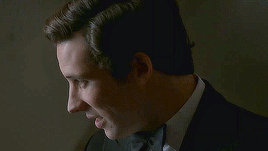
A quick glance over their shoulder.
"You'd look... rather magnificent in a powerful, frightening dress."
#astremourante#the intellectual;julian#;answered#give peace a chance let the fear you have fall away;amelia & julian#i was obsessed with the idea that i had already replied to this but i?? i haven't??? at least i can't find the post#SO HERE IT IS (POTENTIALLY AGAIN)#;queue
1 note
·
View note
Text
Realised that the heroine's love interest for one of my back-burner projects (if you've seen me mention it, the one about a young woman travelling back in time to meet the opera singer she's obsessed with) is basically Julian created before I'd even gotten to TNG S6 😅
Had a difficult childhood and cut off contact with his parents, but grew into a cheerful, extroverted, and even rather naïve adult
His boisterous personality is in no way a façade, but he's also emotionally perceptive (when his own don't run away with him) and a very caring friend
And his main flaw aside from naivete is probably holding himself to too high a standard of perfectionism, and expecting others to come from the same place of optimism and goodwill.
The funny thing is I wasn't even intending to create a character who was "my type", my process was figuring out the kind of person who would fall in love with a mysterious fangirl and brush off his friends' misgivings while also being thoroughly likeable and charming to the story's audience
And now I have a problem because when I work on that story I have to make sure I'm writing my character and not Julian oops
Helps somewhat that I have a definite appearance in mind for him (and they look very little alike aside from having dark hair and a skin tone on the olive spectrum), but I don't know what will happen if I ever get to fully focusing on this story and its cast
#the julian bashir chronicles#probably isn't an intellectual equal for Julian but that's not really fair he's extremely intelligent in his own field
0 notes
Text
practically every character in The Secret History played a role of someone that they were not.
richard and bunny played themselves as rich, when in fact they were poor.
charles and camilla played themselves as pure, when in fact they were weaved with immorality.
francis played himself as cool, when in fact he was an anxious mess.
henry played himself as intellectual, when in fact he was blinded by his own stupidity, wealth, and ego.
julian played himself as a father figure, aiding to the care and minds of the Greek students, when in fact he was conniving and egocentric, swept away by his own gain, unlike a true father.
mrs corcoran played herself as a victim and sorrowful mother of a lost child, when in fact she only cared about her own appearance in front of the camera.
hell, even dr roland played himself as a psychologically-forward man, deep in intellect, when in fact he was nearing dementia and a complete gobble of a man.
i mean, gosh, this theme plays out so grandly. putting up a front and hiding your real self. whether for gain or by self consciousness.
#the secret history#camilla macaulay#charles macaulay#donna tartt#francis abernathy#henry winter#richard papen#tsh#books#bunny corcoran#the secret history memes#the secret history aesthetic#the secret history theory#the secret history analysis#dark acamedia#dark academic aesthetic#dark academia#dark acadamia quotes#dark acadamia aesthetic#dark academism#classic academia#classic#classical literature
2K notes
·
View notes
Text
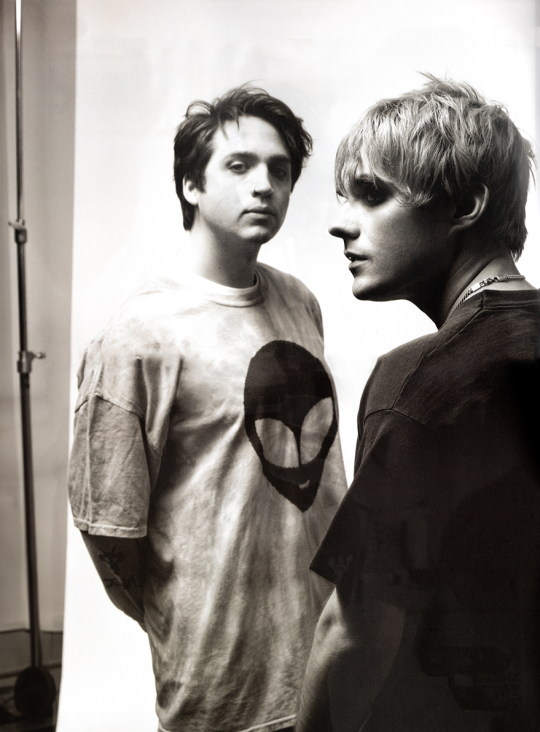
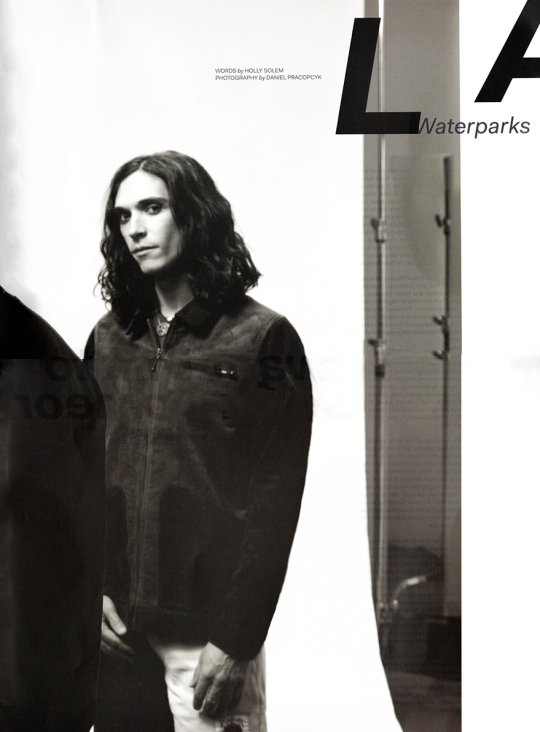
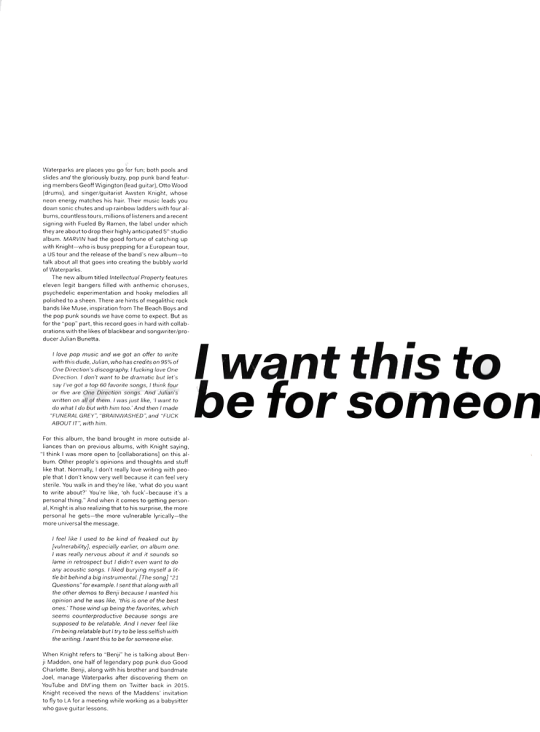
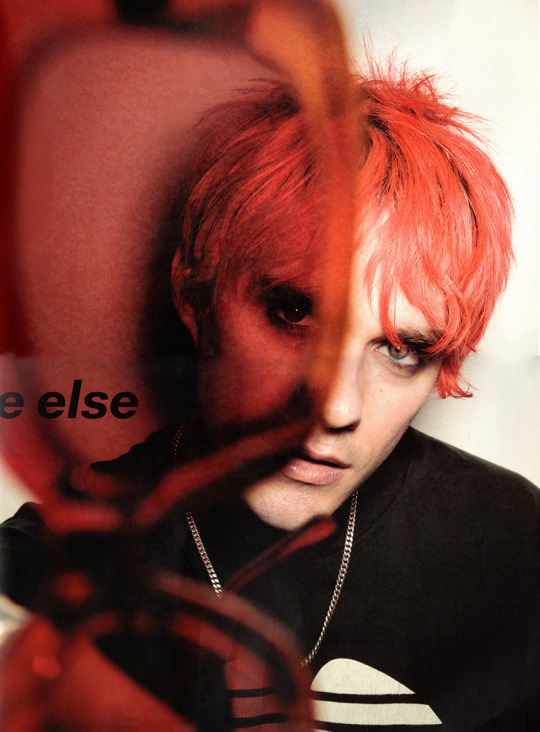
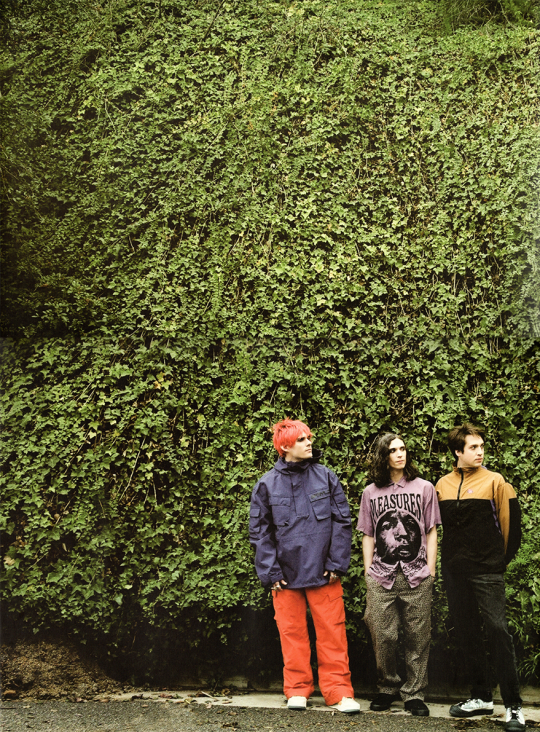
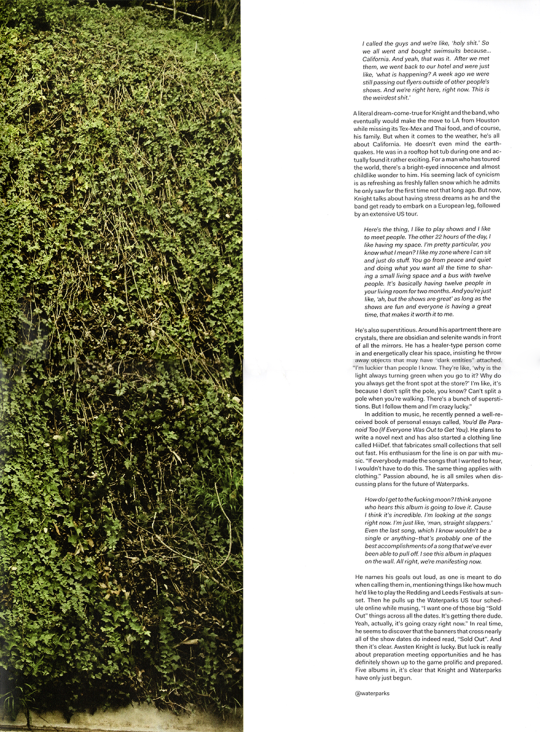
waterparks // marvin magazine issue #10
(full transcript under the cut)
Waterparks
WORDS by HOLLY SOLEM
PHOTOGRAPHY by DANIEL PRACOPCYK
Waterparks are places you go for fun; both pools and slides and the gloriously buzzy, pop punk band featuring members Geoff Wigington (lead guitar), Otto Wood (drums), and singer/guitarist Awsten Knight, whose neon energy matches his hair. Their music leads you down sonic chutes and up rainbow ladders with four albums, countless tours, millions of listeners and a recent signing with Fueled By Ramen, the label under which they are about to drop their highly anticipated 5th studio album. MARVIN had the good fortune of catching up with Knight—who is busy prepping for a European tour, a US tour and the release of the band's new album—to talk about all that goes into creating the bubbly world of Waterparks.
The new album titled Intellectual Property features eleven legit bangers filled with anthemic choruses. psychedelic experimentation and hooky melodies all polished to a sheen. There are hints of megalithic rock bands like Muse, inspiration from The Beach Boys and the pop punk sounds we have come to expect. But as for the "pop" part, this record goes in hard with collaborations with the likes of blackbear and songwriter/producer Julian Bunetta.
I love pop music and we got an offer to write with this dude, Julian, who has credits on 95% of One Direction's discography. I fucking love One Direction. I don't want to be dramatic but let's say I've got a top 60 favorite songs, I think four or five are One Direction songs. And Julian's written on all of them. I was just like, 'I want to do what I do but with him too.' And then I made "FUNERAL GREY", "BRAINWASHED", and "FUCK ABOUT IT", with him.
For this album, the band brought in more outside alliances than on previous albums, with Knight saying. "I think I was more open to [collaborations] on this album. Other people's opinions and thoughts and stuff like that. Normally, I don't really love writing with people that I don't know very well because it can feel very sterile. You walk in and they're like, 'what do you want to write about? You're like, 'oh fuck'—because it's a personal thing." And when it comes to getting personal, Knight is also realizing that to his surprise, the more personal he gets-the more vulnerable lyrically—the more universal the message.
I feel like I used to be kind of freaked out by [vulnerability], especially earlier, on album one. I was really nervous about it and it sounds so lame in retrospect but I didn't even want to do any acoustic songs. I liked burying myself a lit- tle bit behind a big instrumental. [The song] "21 Questions" for example. I sent that along with all the other demos to Benji because I wanted his opinion and he was like, 'this is one of the best ones.' Those wind up being the favorites, which seems counterproductive because songs are supposed to be relatable. And I never feel like I'm being relatable but I try to be less selfish with the writing. I want this to be for someone else.
When Knight refers to "Benji" he is talking about Benji Madden, one half of legendary pop punk duo Good Charlotte. Benji, along with his brother and bandmate Joel, manage Waterparks after discovering them on YouTube and DM'ing them on Twitter back in 2015. Knight received the news of the Maddens' invitation to fly to LA for a meeting while working as a babysitter who gave guitar lessons.
I called the guys and we're like, 'holy shit.' So we all went and bought swimsuits because…California. And yeah, that was it. After we met them, we went back to our hotel and were just like, 'what is happening? A week ago we were still passing out flyers outside of other people's shows. And we're right here, right now. This is the weirdest shit.'
A literal dream-come-true for Knight and the band, who eventually would make the move to LA from Houston while missing its Tex-Mex and Thai food, and of course, his family. But when it comes to the weather, he's all about California. He doesn't even mind the earthquakes. He was in a rooftop hot tub during one and actually found it rather exciting. For a man who has toured the world, there's a bright-eyed innocence and almost childlike wonder to him. His seeming lack of cynicism is as refreshing as freshly fallen snow which he admits he only saw for the first time not that long ago. But now, Knight talks about having stress dreams as he and the band get ready to embark on a European leg, followed by an extensive US tour.
Here's the thing, I like to play shows and I like to meet people. The other 22 hours of the day, I like having my space. I'm pretty particular, you know what I mean? I like my zone where I can sit and just do stuff. You go from peace and quiet and doing what you want all the time to sharing a small living space and a bus with twelve people. It's basically having twelve people in your living room for two months. And you're just like, 'ah, but the shows are great' as long as the shows are fun and everyone is having a great time, that makes it worth it to me.
He's also superstitious. Around his apartment there are crystals, there are obsidian and selenite wands in front of all the mirrors. He has a healer-type person come in and energetically clear his space, insisting he throw away objects that may have "dark entities" attached. "I'm luckier than people I know. They're like, 'why is the light always turning green when you go to it? Why do you always get the front spot at the store?' I'm like, it's because I don't split the pole, you know? Can't split a pole when you're walking. There's a bunch of superstitions. But I follow them and I'm crazy lucky."
In addition to music, he recently penned a well-received book of personal essays called, You'd Be Paranoid Too (If Everyone Was Out to Get You). He plans to write a novel next and has also started a clothing line called HiiDef. that fabricates small collections that sell out fast. His enthusiasm for the line is on par with music. "If everybody made the songs that I wanted to hear, I wouldn't have to do this. The same thing applies with clothing." Passion abound, he is all smiles when discussing plans for the future of Waterparks.
How do I get to the fucking moon? I think anyone who hears this album is going to love it. Cause I think it's incredible. I'm looking at the songs right now. I'm just like, 'man, straight slappers.' Even the last song, which I know wouldn't be a single or anything-that's probably one of the best accomplishments of a song that we've ever been able to pull off. I see this album in plaques on the wall. All right, we're manifesting now.
He names his goals out loud, as one is meant to do when calling them in, mentioning things like how much he'd like to play the Redding and Leeds Festivals at sunset. Then he pulls up the Waterparks US tour schedule online while musing, "I want one of those big "Sold Out" things across all the dates. It's getting there dude. Yeah, actually, it's going crazy right now." In real time, he seems to discover that the banners that cross nearly all of the show dates do indeed read, "Sold Out". And then it's clear. Awsten Knight is lucky. But luck is really about preparation meeting opportunities and he has definitely shown up to the game prolific and prepared. Five albums in, it's clear that Knight and Waterparks have only just begun.
@waterparks
#i scanned this big ass magazine and photoshopped it back together after i found out you could buy this digitally so you better reblog#awsten knight#otto wood#geoff wigington#waterparks#i.zip#anyways story time#only reason i bought this is bc i saw this at barnes and noble at the mall and it was wayyy cheaper than if i got a physical online#$25 instore vs $30 online + $20 shipping which is INSANE but the fact that this is the size of my torso is even more insane#it's just some puff piece like the rest of the shit you'd expect from a rich people magazine that brands itself as punk#and that josh madden shilled his way into again lol
179 notes
·
View notes
Text
Yan!Julius Caesar Random Headcanons
❝ 📜— lady l: I love writing these random headcanons and if you guys want more historical characters feel free to send them! If you're curious about how he is yandere, I posted a general headcanon of him, which you can read by clicking here. Here are historical facts and some additional ones from my head. I hope you like it and good reading!! ❤️
❝tw: not entirely historically accurate and perhaps murder (?).

Julius Caesar was born in 100 BC and became an important Roman military and political leader. His conquest of Gaul (present-day France) and his successful campaigns contributed to his rise to power.
In 44 BC, Julius Caesar was appointed dictator for life by the Roman Senate. This move sparked concern among senators, leading to a plot that resulted in his assassination on March 15, 44 BC, known as the "Ides of March". The man did not last long as a dictator.
Julius Caesar played an important role in reforming the Roman calendar. The Julian calendar, introduced in 45 BC, was an adaptation of the lunar calendar to the solar year, forming the basis of the modern Gregorian calendar. So much so that the month of July is in his honor.
Julius Caesar formed a political alliance known as the First Triumvirate with Pompey and Crassus. They shared power and influence to advance their political and personal agendas. It didn't last long because soon they started fighting each other for power. A yandere obsessed with power, I dare say.
Julius Caesar is known for writing "Commentaries on the War in Gaul", also called as Commentarii de Bello Gallico, a series of accounts of his campaigns in the region. These writings offer valuable information about military tactics and life at that time. A great military commander and also a great fanfic writer.
There are reports that say that when he was 30 years old, he passed in front of a statue of Alexander the Great and wept because he had reached the same age and had not conquered as much as the Macedonian King. An inferiority complex, I would say.
The title "Caesar" became a dynastic name used by many Roman leaders after Julius Caesar. The first Roman Emperor, Augustus, was his nephew and adopted heir, and he adopted the title "Caesar" as part of his name. A curious fact is that many Brazilians have Caesar (César in portuguese) in their name.
In addition to his military achievements, Julius Caesar had a deep taste for literature and writing. He frequently exchanged letters and discussed poetry with various intellectuals of the day. A true cultured man and a renaissance ahead of time.
The death of Julius Caesar was one of the key events that contributed to the fall of the Roman Republic and the subsequent rise of the Roman Empire. His legacy has had a lasting impact on history and politics. Our man is credited as one of the greatest military commanders of all time.
Rumor has it that Julius Caesar had a secret superstition of avoiding black cats, believing them to bring bad luck. This contrasted with his image as a fearless leader. Poor kitty, so many powerful men were afraid of cats.
#history#yandere historical characters#yandere julius caesar#yandere julius caesar headcanons#julius caesar#headcanons#yandere headcanons#yandere history
142 notes
·
View notes